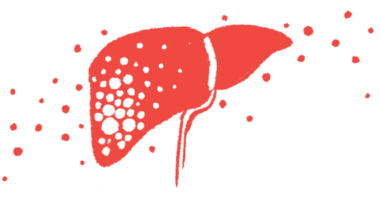Acute Hepatic Porphyrias Linked to Kidney Cancer, Kidney Disease: Study
No increased risk of non-liver cancers seen in AHP patients

People with acute hepatic porphyria (AHP) have an increased risk of kidney cancer, chronic kidney disease, and high blood pressure, a large-scale Swedish study found.
AHP patients don’t have a higher risk of non-liver cancers in general, heart-related diseases, or severe psychiatric disorders, however, according to researchers, who recommended improving care for long-term AHP complications, mainly kidney diseases and high blood pressure based on these findings.
The study, “Risk for incident comorbidities, nonhepatic cancer and mortality in acute hepatic porphyria: A matched cohort study in 1244 individuals,” was published in the Journal of Inherited Metabolic Disease.
AHP is a group of porphyrias that includes acute intermittent porphyria (AIP), hereditary coproporphyria (HCP), and variegate porphyria (VP). Despite having different genetic causes, all are marked by molecules called porphyrins building up in various tissues and organs, eventually reaching harmful levels.
Using a large nationwide Swedish porphyria registry, researchers in Sweden recently found that having AHP meant being at 38 times greater risk of primary liver cancer. This increased risk mainly applied to those with biochemically active AIP, also called Swedish porphyria, due to the country’s relatively high disease prevalence.
The team has now evaluated the risks of other co-existing conditions (comorbidities), such as non-liver cancers, heart disease, and psychiatric disorders, in AHP patients using the same database.
Data were collected on 1,244 AHP patients alongside a control group of 12,362 randomly selected people without AHP from the general population, matched by age, sex, and county of residence.
A total of 1,063 AHP patients were diagnosed with AIP (85%), while 125 had VP (10%), and 56 had HCP (5%). Among those with available data, 494 (46%) AIP patients were biochemically active, meaning they tested positive for urinary porphobilinogen (PBG) — the porphyrin that builds up to harmful levels and causes AIP.
During follow-up, 149 AHP patients (12%) and 1,601 (13%) matched controls developed non-liver cancers, with no overall increased risk found when stratifying participants by sex, AHP type, or PBG levels. No increased risk was seen for the most common forms of cancer, including prostate, breast, skin, colorectal, and lung cancer.
Among AIP patients with elevated PBG levels, non-liver cancer risks were similar to the matched reference group. However, there was a decreased risk of non-liver cancers in male AHP patients, and across all AHP patients, a trend for a lower risk of cancer forms related to smoking, lung cancer, and bladder cancer.
Prevalence of kidney cancer with AHP
Kidney cancer was significantly more prevalent in patients with AHP, with 10 (0.8%) reported cases compared with 27 (0.2%) in controls, representing an almost fourfold higher risk. Among the 10 AHP kidney cancer patients, two had VP and eight had AIP. All six AIP patients with recorded urinary PBG tests had elevated levels.
Chronic kidney disease (CKD) and kidney diseases overall were more common in AHP, particularly in PBG-positive AIP patients, than in controls. There was an almost fivefold increased risk of advanced CKD in AHP patients and a sevenfold higher risk in PBG-positive AIP patients.
High blood pressure occurred more often in AHP patients (20%) than in non-AHP comparators (15%), particularly in the PBG-positive AIP group (30%). Diseases affecting the brain’s blood vessels were more frequent in the PBG-positive AIP group, mainly related to more strokes, but not in AHP in general. While the risk of deep vein blood clots was higher in AHP, the risk of heart failure, atrial fibrillation (irregular heartbeat), heart attack, and other artery diseases did not differ between AHP and controls.
A diagnosis of nerve damage (neuropathy) was low in AHP but more prevalent than in controls (1.3% vs. 0.5%). Psychiatric disorders and behavioral disorders were more frequently diagnosed in AHP, but other common disorders, including dementia and psychosis, were not.
During follow-up, mortality was higher in AHP than in controls (21% vs. 18%), particularly among females and in those with PBG-positive AIP. After excluding patients with primary liver cancer, the mortality differences between all AHP cases and control participants were no longer statistically significant. A higher mortality risk remained among females with AHP, though.
Based on the recorded causes of death, AHP patients had a higher risk of death caused by kidney disease, primary liver cancer, and porphyria compared with controls.
No increased risk of non-liver cancers
Researchers found no increased risk of non-liver cancers among those with VP and HCP. Three patients with VP (2.4%) developed CKD (one, advanced CKD), while one HCP patient developed advanced CKD. Although high blood pressure occurred more often in VP, risks of cardiovascular diseases did not differ compared with controls, nor did the risks of neuropathy, psychiatric disorders, or mortality.
“Patients with AHP do not have an increased risk of nonhepatic cancers in general, cardiovascular diseases, or severe psychiatric diseases,” the researchers wrote, adding increased risks of [high blood pressure], CKD, and kidney cancer were seen.
They said “attention could be focused on improving care for long-term AHP complications, mainly [kidney] complications, [high blood pressure], and [primary liver cancer]” since the mortality risk “associated with acute porphyria attacks” is low.







